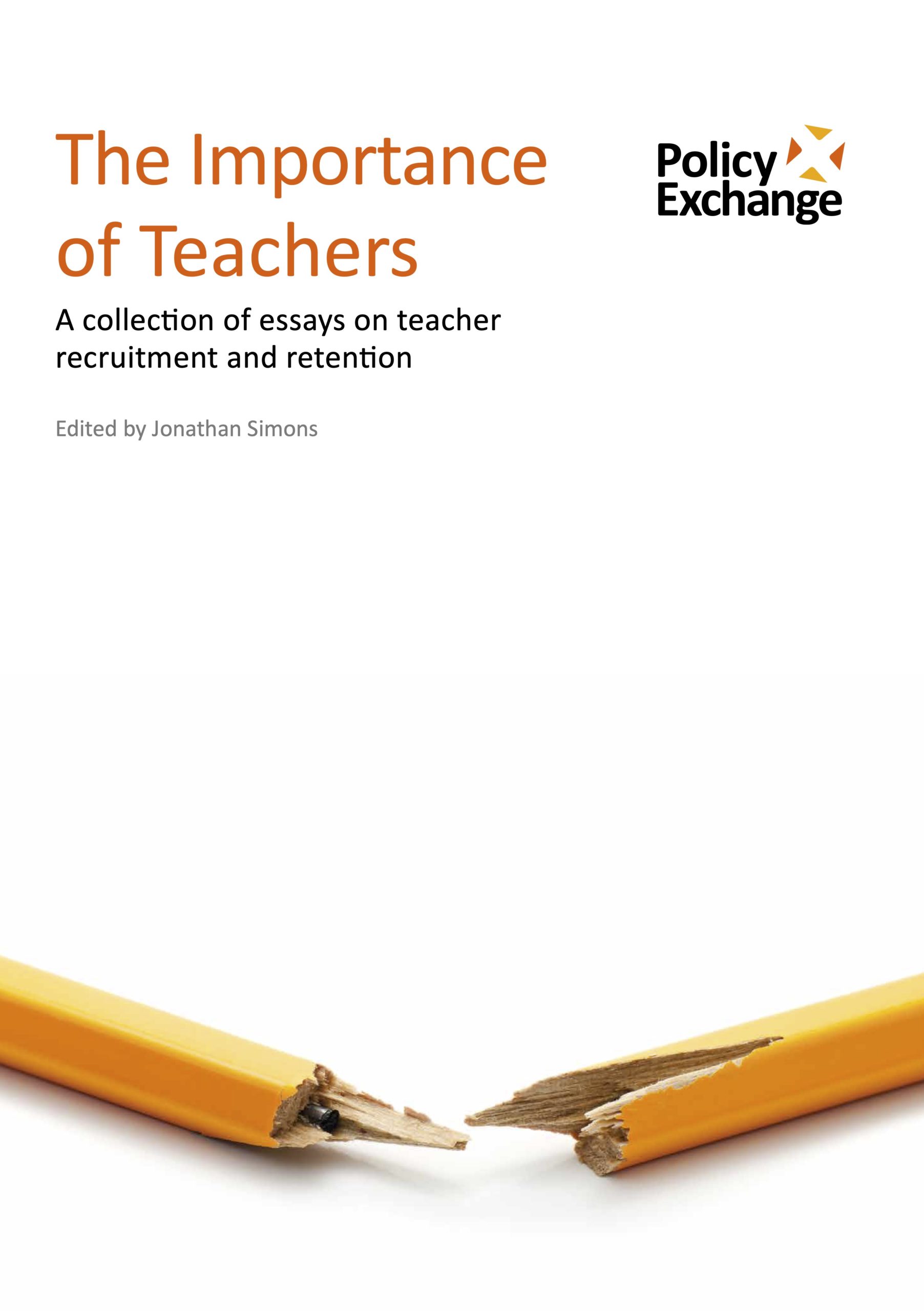
The Importance of Teachers: A collection of essays on teacher recruitment and retention
In 2010, the DfE published a White Paper entitled “The Importance of Teaching”. This set out the overall direction of travel for the Coalition government, including recognising the importance of teaching to improving school standards. The title of this essay collection deliberately reflects and builds on this work. For if teaching (the practice) is important, even more so are the people – the teachers.
This collection of essays follows a half day conference held by Policy Exchange – also in partnership with the Association of School and College Leaders in October last year on the topic of the future of the teaching workforce – supply, recruitment, retention and deployment. We have asked selected individuals to further develop thoughts on action that both government and individual and groups of schools can take to alleviate the undoubted shortage of teachers that the English state school system currently faces, and is predicted to continue to face for the next few years.
The essays cover a number of themes:
– a general overview of the labour market for teachers
– the role played by ITT, an area which has seen significant change in recent years.
– how to develop and retain the large numbers of teachers we have in the system already
– the deployment of teachers across the country.
The conclusions are, on occasion, provocative. They are not all in line with where government policy currently is. They do not all agree with each other! But what they all illustrate powerfully is what Leora Cruddas from ASCL highlights in her essay – “It is time we disrupted the narrative of a beleaguered profession with low morale that constantly needs to be kept in check by government – rather, we as a system need to be at the forefront of designing new approaches to recruitment retention to address the challenges we face.”
Testimonials
Department for Education: “we are clear that too many female teachers are leaving the profession and not returning, and we want to change that. The ASCL and Policy Exchange report is right to highlight the issue of flexibility for those who wish to return to teaching. The latest figures show that the number of former teachers returning to the classroom is rising year on year, which is encouraging. But we know that a lack of flexible options creates a barrier, in particular for women who take a career break, and we will soon be announcing further work to support flexible working for female teachers and to encourage women to return to the classroom.”
Lucy Powell MP, Shadow Secretary of State for Education: “we need urgent action to retain as many good teachers as possible”
The below email was sent to Jonathan from a part time teacher, illustrating some of the difficulties faced by working mothers. All identifying details have been anonymised.
“Dear Jonathan
I have read your recent report “The Importance of Teachers” and wanted to draw an issue to your attention with many part time contracts offered by schools which I know is driving many working mums to unwillingly quit the profession/ to decide to take extended career breaks (potentially never to return). I will illustrate this with my own part-time contract:
I requested to work 0.6 FTE to better balance my career and family needs as I had one child, a husband who works away and no family locally. The school can vary this by 0.2 FTE in any given academic year i.e. 0.4FTE to 0.8FTE. The contract states that the school will “where possible” try to ensure that teaching is split into full and half-day chunks however, last year they offered me 0.6FTE over 9 days across a fortnight – hardly what one would consider family flexible working!
Furthermore, the practicalities of this timetable meant considerable childcare costs. For example, on one of these days I was asked to teach period 3 only – resulting in a whole day’s childcare costs as it was in the middle of the day. On another day, I only teach period 5 – resulting in it taking me longer to drive to and from work in the rush hour traffic than teach. On 3 other days I was timetabled to teach only in the afternoon, P3 – 5 – again resulting in a full day’s childcare costs for 3 hours’ pay.
In discussions with the school, I managed to negotiate dropping the one day where I only teach one lesson but this resulted in me having to drop one class and therefore from 0.6FTE to 0.52FTE over 8 days (2 of these half days).
I am currently on maternity leave with my second child and I am concerned that, with 2 children in nursery, if the school offer me a poor timetable again (which could be as bad as 0.4 FTE spread over 10 days costing the earth in childcare, or 0.8FTE over 10 days when I will feel that I am not spending the time at home that I need) I risk having to pay to go to work on my return after childcare and travel costs to keep my career going and/or not have sufficient time at home that I was after when working part time, with a cost to my family life.
I know from other schools and Heads of Department that it is perfectly possible to create a timetable that works for part-timers and then timetable full timers around them. My school instead use part-timers to fill in any challenges with the timetable e.g. to avoid splitting classes between multiple teachers and to deal with ebbs and flows in annual timetabling e.g. how many GCSE courses/A Level courses they need to run.
One further issue is that the school changes the timetable every year, but this doesn’t get published until June at the earliest – which is, of course, too late for any part-timer to hand in their notice to leave, and so the school holds the part-time staff over the barrel again in the annual negotiations.
Where are the unions in all of this? My union were less than helpful: telling me only to contact them if negotiations meant that it would cost me to work (my cut off point). I would far rather they campaign for decent part-time contracts rather than general campaigning on salary and pensions – to campaign for a situation where 0.6FTE means 3 days a week even if this means some of this being made up of half days and even if this means a different timetable on Week A and Week B of a timetable and allowing for the school to change this each academic years which I feel would be a reasonable deal.

